Abu Bakr as-Siddiq
May Allah Be Well Pleased With Him
"The moon traverses the constellations of the zodiac in a single night,
so why do you deny the mi`raj (Ascension)?
That wondrous, unique Pearl (the Prophet) is like a hundred moons
--for when he made one gesture, the moon was split in two.
And the marvel that he displayed in splitting the moon
was in keeping with the weakness of the creatures' perception.
The work and business of the prophets and messengers
is beyond the spheres and the stars.
Transcend the spheres and their revolution!
Then you will see that work and business."
Rumi, Mathnavi.
The Secret was transmitted and flowed from the Master of all Nations, the Messenger of Allah to the first Khalif, Imam of Imams, Abu Bakr as-Siddiq . Through him the religion was supported and the Truth protected. Allah mentions and praises him in His Holy Qur'an in many verses:
"As for him who gives and keeps his duty, we facilitate for him the way to ease." (Al-Lail (5-7):=)
and
"And (away from the fire) shall be kept the most faithful who gives his wealth, thereby purifying himself,and seeks to gain no pleasure or reward other than the Presence of his Lord, the Most High." (Al-Lail (17-21))
Ibn al-Jawzi states that all Muslim scholars and the Companions were certain that these ayats referred to Abu Bakr. Among all the people he was called "Al-`Atiq," the most pious, delivered from the punishments of the fire.
When ayat 56 of Surah Al-Ahzab revealed that "Allah and his angels bless the Holy Prophet," Abu Bakr asked if he also was included in this blessing. Ayat 43 was then revealed stating:
"He it is who sends His blessing on you and so do His angels, that He may bring you forth out of darkness into light. And He is merciful to the believers." (Al-Ahzab (43))
Ibn Abi Hatim explained that ayat 46 of Surah Ar-Rahman came in reference to Abu Bakr as-Siddiq:
"And for him who fears to stand before his Lord there are two gardens." (Ar-Rahman (46))
and:
"We have enjoined on man kindness to his parents: in pain did his mother bear him, and in pain did she give him birth. The carrying of the (child) to his weaning is thirty months. At length, when he reaches the age of full strength and attains forty years, he says, "O my Lord! Grant me that I may be grateful for Thy favor which Thou hast bestowed upon me, and upon both my parents, and that I may work righteousness such as Thou mayest approve; and be gracious to me in my issue. Truly have I turned to Thee and truly do I bow (to Thee) in submission." Such are they from whom We shall accept the best of their deeds and pass by their ill deeds: (they shall be) among the Companions of the Garden: a promise of truth, which was made to them (in this life)." (Al-Ahqaf (15-16))
Ibn `Abbas says that these ayats came as a description of Abu Bakr as-Siddiq, Allah honoring and elevating his state among all the Companions of the Prophet . Ibn `Abbas notes further that ayat 158 of Surah Al-Imran was revealed in reference to Abu Bakr and Umar :
"And take council with them on important matters." (Al-Imran (158))
Finally, the great honor accorded to Abu Bakr in accompanying the Holy Prophet on his flight from Makkah to Madinah, is referred to in the ayat:
"When the unbelievers drove him out, he had no more than one companion. The two were in the Cave, and he said to his companion, Fear not, for Allah is with us." (At-Tawbah (40))
In addition to the praise of Allah, Abu Bakr as-Siddiq received the praise of the Holy Prophet and of his companions. This is recorded in many well known Hadiths.
The Holy Prophet said:
"Allah will show His glory to the people in a general way, but He will show it to Abu Bakr in a special way."
"Never has the sun risen or set on a person, other than a prophet, greater than Abu Bakr."
"Never was anything revealed to me that I did not pour into the heart of Abu Bakr."
"There is no one to whom I am obligated and have not repaid my debt except Abu Bakr, for I owe him much for which Allah will compensate him on the Day of Judgment."
"If I were to take an intimate friend (khalil) other than my Lord, I would have chosen Abu Bakr."
"Abu Bakr does not precede you because of much prayer or fasting, but because of a secret that is in his heart."
Bukhari narrates from Ibn `Umar that, "In the time of the Prophet we were not recognizing anyone higher than Abu Bakr as-Siddiq, then `Umar, then `Uthman."
Bukhari also narrates from Muhammad ibn al-Hanafiya (Ali's son): "I asked my father, 'Who are the best people after Allah's Apostle ?' He said, 'Abu Bakr.' I Asked, 'Who then?' He said, Then `Umar. I was afraid he would say `Uthman next, so I said: 'Then you?' He replied, 'I am only an ordinary person.'"
Tabarani narrated through Mu`adh that the Prophet said, "I had a vision that I was put on one side of the scale and my Nation was put on the other side and I was heavier. Then Abu Bakr was put on one side and My Nation was put on one side and Abu Bakr was heavier. Then `Umar was put on one side and My Nation was put on the other and `Umar was heavier. Then `Uthman was put on one side and My Nation on the other and `Uthman was heavier. Then the scale was raised up."
Hakim narrated that `Ali was asked, "O Ruler of the Faithful, tell us about Abu Bakr." He said, "He is a person whom Allah called as-Siddiq on the tongue of the Prophet and he is the khalif (successor) of the Prophet . We accept him for our religion and for our worldly life."
There are many other hadiths indicating the great attainment of Abu Bakr as-Siddiq with respect to all the other Sahaba.
Abu Bakr was the best friend and most beloved companion of the Holy Prophet . He was blessed by being first and foremost, throughout his life, in his belief, his support, and his love of the Holy Prophet. For this quality he was honored with the title of as-Siddiq, or the Veracious.
He was the first free adult man to accept Islam at the hands of the Prophet . He had never joined in the worship of idols practiced by his contemporaries. He came to Islam without any trace of doubt or hesitation. Many years later the Holy Prophet recalled: "Whenever I offered Islam to anyone, he always showed some reluctance and hesitation and tried to enter into an argument. Abu Bakr was the only person who accepted Islam without any doubt or hesitation, and without any argument."
He was first in his spiritual support. He remained steadfast in his support throughout the difficult years in Makkah. He was the first to speak out when events passed beyond the understanding even of the new Muslims themselves, as in the case of the Night Journey. And later in Madinah when the treaty of Hudaybiya was signed, only Abu Bakr remained absolutely faithful. He counseled his companions: "Do not be critical, but hold fast to the stirrup (allegiance) of the Holy Prophet."
He was first in his material support. While others of the Muslims gave large fortunes in support of their faith, Abu Bakr was the first to give everything he had. When asked what he had left for his children he answered: "Allah and His Prophet ." On hearing this Umar said: "None can surpass Abu Bakr in serving the cause of Islam."
He was first in kindness and compassion to his fellow believers. A very wealthy merchant, he always watched out for the poor and the weak. He freed seven slaves before leaving Makkah, among them Bilal . He not only spent large amounts to buy them freedom but he then took them into his own household and educated them.
When he assumed the role of khalif he said: "Help me, if I am in the right; set me right, if I am in the wrong. The weak among you shall be strong with me until, God willing, his rights have been vindicated. The strong among you shall be weak with me until, if God wills, I have taken what is due from him. Obey me as long as I obey Allah and His Prophet; when I disobey Him and his Prophet, obey me not."
In early Islam, interpretation of dreams was considered a spiritual exercise. Only those with pure hearts and spiritual vision could have meaningful dreams; and only those with pure hearts and spiritual vision could interpret them. Abu Bakr was an acknowledged interpreter of dreams. The Prophet himself would consult only him in search for clarity of his prophetic dreams.
Before the battle of Uhud, the Holy Prophet saw in a dream that he was herding animals and some of these were being slaughtered. The sword that he held had a piece broken off. Abu Bakr interpreted the slaughtered animals to prophesize the death of many Muslims, and the broken sword to signify the death of one of the Prophet's relatives. Unfortunately both these predictions were realized at the battle of Uhud.
Abu Bakr was also a poet before he became Muslim. He was known for his exceptional recitation and his excellent memory of the long poems in which the Arabs took great pride. These qualities served him well in Islam. His recitation of the Qur'an was so lyrical and charged with emotion that many people came to Islam simply after hearing him pray. The Quraish tried to forbid him to pray in the courtyard of his house in order to prevent the people from hearing him.
It is due to his memory that many of the most important Hadiths come to us today. Among them are those indicating the proper form of prayer and those specifying the proper proportions of Zakat. Yet out of the many thousands of Hadith verified and recorded, only 142 come through Abu Bakr. His daughter, `Ayesha , related that her father kept a book of over 500 Hadith but that one day he destroyed it. The knowledge that Abu Bakr chose to keep hidden related to the heavenly knowledge, `ilmu-l-ladunni, the source of all saintly knowledge; a knowledge that can only be transmitted from heart to heart.
Although a quiet and gentle man he was also first on the battlefield. He supported the Holy Prophet in all of his campaigns both with his sword and with his counsel. When others failed or ran he remained at the side of his beloved Prophet. It is stated that once `Ali asked his companions who they considered to be the bravest. They replied that `Ali was the bravest. But he answered: "No. Abu Bakr is the bravest. On the day of the battle of Badr when there was no one to stand guard where the Holy Prophet prayed, Abu Bakr stood with his sword and did not allow the enemy to come near."
He was of course the first to follow the Holy Prophet as Khalif and leader of the Faithful. He instituted the public treasury (Baytu-l-mal) to take care of the poor and needy. He was the first to compile the entire Qur'an and call it "Mushaf."
In regard to spiritual transmission, he was the first person to give instruction in the method of reciting the sacred Kalima (La ilaha ill-Allah) for purifying the heart by Dhikr, and that is still recited by the Naqshbandi Order today.
Although Allah honored Abu Bakr by making him first in innumerable ways, Allah granted him even more honor when he chose him to be second. For Abu Bakr was the only companion of the Holy Prophet on his flight from persecution in Makkah to shelter in Madinah. Probably his dearest title was "the second of two when they were in the cave," already quoted (9:40). Umar said: "I wish all the deeds of my life were equal to his deed of that one day."
Ibn `Abbas said that one day the Prophet was sick. He went to the mosque, wrapped his head with a cloth, sat on the minbar, and said, "If I were to take anyone as my intimate friend (khalil), I would take Abu Bakr, but the best friend to me is the friendship of Islam." He then ordered all doors of the neighboring houses which opened into the mosque of the Prophet to be closed except the one of Abu Bakr. And that door is still open till this day.
The four Imams and the Shaikhs of the Naqshbandiyya understand from this Hadith that anyone who approaches Allah through the teachings and example of Abu Bakr will find himself passing through the only door left open to the Presence of the Prophet .
From His Saying
"No speech is good if it is not directed toward the pleasure of Allah. There is no benefit from money if it isn't spent in the cause of Allah. There is no good in a person if his ignorance overcomes his patience. And if a person becomes attracted by the charms of this lower world, Allah will dislike him as long as he keeps this in his heart."
"We have found generosity in Taqwa (God-consciousness), richness in Yaqin (certainty), and honor in humbleness."
"Beware of pride because you will be returning to the earth and your body will be eaten up by the worms."
When he was praised by people he would pray to Allah saying:
"O Allah, You know me better than I know myself, and I know myself better than these people who praise me. Make me better than what they think of me, and forgive those sins of mine of which they have no knowledge, and do not hold me responsible for what they say."
"If you expect the blessings of God be kind to His people."
One day he called `Umar and counseled him till `Umar cried. Abu Bakr told him:
"If you keep my counsel, you will be safe; and my counsel is: Expect death always and live accordingly."
"Glory to God who has not given to his creatures any way to attain to knowledge of Him except by means of their helplessness and their hopelessness of ever reaching such attainment."
Abu Bakr returned to Allah on a Monday (as did the Prophet himself) between Maghrib and `Isha on the 22 of Jumada'l-akhira, 13 A.H. May Allah bless him and give him peace. The Holy Prophet once said to him: "Abu Bakr, you will be the first of my people to enter paradise."
The Prophet's Secret passed from Abu Bakr to his successor, Salman al Farsi .
Qassim ibn Muhammad ibn Abu Bakr
May Allah Be Well Pleased With Him
"So long as you have not contemplated the Creator,
you belong to created beings;
but when you have contemplated Him,
created beings belong to you."
Ibn `Ata'Allah, Hikam.
He was one of the seven most famous jurists in Madinat al-Munawwara. It was through these seven great Imams that hadith, fiqh (jurisprudence) and tafsir (exegesis) of the Qur'an were disseminated to the people. His mother was the daughter of the last king of Persia, Yazdagir. His grandfather was the first khalif, Abu Bakr as-Siddiq. He met some of the Tabi`in, such as Salim bin `Abdullah ibn `Umar .
He was a pious imam and was very knowledgeable in hadith narration. Abu Zannad said, "I never saw anyone better than him in following the Sunnah of the Prophet . In our time no one is considered perfect until he is perfect in following the Sunnah of the Prophet . And Qassim is one of the perfected men."
Abdur Rahman ibn Abi Zannad said that his father said, "I didn't see anyone who knew the Sunnah better than al-Qassim did."
Abu Nu`aym said of him in his book Hilyat al-Awliya: "He was able to extract the deepest juristic rulings and he was supreme in manners and ethics."
Imam Malik narrated that `Umar bin `Abdul Aziz , considered the fifth rightly-guided khalif, said, "If it was in my hands, I would have made al-Qassim the khalif in my time."
Sufyan said, "Some people came to al-Qassim with sadaqa (a donation) which he distributed. After he distributed it he went to pray. While he was praying the people began to speak negatively about him. His son said to them, 'You are speaking behind the back of a man who distributed your sadaqa and didn't take one dirham from it for himself.' Quickly his father scolded him saying, 'Don't speak, but keep quiet.' He wanted to teach his son not to defend him, as his only desire was to please Allah and he had no concern for the opinion of people.
Yahya bin Sayyid said, "We never found, in our time in Madinah, anyone better than al-Qassim." Ayyub as-Saqityani said, "I haven't seen anyone better than Imam Qassim. He left 100,000 dinars behind for the poor when he passed away, and it was all from his lawful (halal) earnings."
He died in a place between Makkah and Madinah called al-Qudayd in the year 108 (or 109) H. while he was on pilgrimage. He was seventy years old at the time of his passing.
Al-Qassim passed the Secret of the Golden Chain to his successor, his grandson, the Imam Ja'far as-Sadiq .
Ja`far as-Sadiq
May Allah Bless Him and Give Him Peace
"I have discovered -- and exaggeration is not in my nature --
that he who is my sustenance will come to me.
I run to him, and my quest for him is agony for me.
Were I to sit still, he would come to me without distress."
`Urwa ibn Adhana.
The son of Imam Muhammad al-Baqir, son of al-Imam Zain al-`Abidin, son of al-Husayn, son of `Ali bin Abi Talib , Ja`far was born on the eighth of Ramadan in the year 83 H. His mother was the daughter of al-Qassim , whose great grandfather was Abu Bakr as-Siddiq .
He spent his life in worship and acts of piety for the sake of Allah. He rejected all positions of fame in favor of `uzla or isolation from the lower world. One of his contemporaries, `Umar ibn Abi-l-Muqdam, said, "When I look at Ja`far bin Muhammad I see the lineage and the secret of the Prophet Muhammad united in him."
He received from the Prophet two lines of inheritance: the secret of the Prophet through 'Ali and the secret of the Prophet through Abu Bakr . In him the two lineages met and for that reason he was called "The Inheritor of the Prophetic Station (Maqam an-Nubuwwa) and the Inheritor of the Truthful Station (Maqam as-siddiqiyya)." In him was reflected the light of the knowledge of Truth and Reality. That light shone forth and that knowledge was spread widely through him during his lifetime.
Ja`far narrated from his father, Muhammad al-Baqir, that a man came to his grandfather, Zain al-`Abidin, and said, "Tell me about Abu Bakr!" He said, "You mean as-Siddiq?" The man said, "How do you call him as-Siddiq when he is against you, the Family of the Prophet ?" He replied, "Woe to you. The Prophet called him as-Siddiq, and Allah accepted his title of as-Siddiq. If you want to come to me, keep the love of Abu Bakr and `Umar in your heart."
Ja`far said, "The best intercession that I hope for is the intercession of Abu Bakr as-Siddiq ." From him is reported also the following invocation: "O Allah, You are my Witness that I love Abu Bakr and I love `Umar and if what I am saying is not true may Allah cut me off from the intercession of Muhammad ."
He took the knowledge of hadith from two sources: from his father through `Ali and from his maternal grandfather al-Qassim. Then he increased his knowledge of hadith by sitting with `Urwa, `Aata, Nafi` and Zuhri. The two Sufyans, Sufyan ath-Thawri and Sufyan ibn `Uyayna, Imam Malik, Imam Abu Hanifa, and al-Qattan all narrated hadith through him, as did many others from later hadith scholars. He was a mufassir al-Qur'an or master in exegesis, a scholar of jurisprudence, and one of the greatest mujtahids (qualified to give legal decisions) in Madinah.
Ja`far acquired both the external religious knowledge as well as the internal confirmation of its reality in the heart. The latter was reflected in his many visions and miraculous powers, too numerous to tell.
One time someone complained to al-Mansur, the governor of Madinah, about Ja`far . They brought him before Mansur and asked the man who had complained, "Do you swear that Ja`far did as you say?" He said, "I swear that he did that." Ja`far said, "Let him swear that I did what he accused me of and let him swear that Allah punish him if he is lying." The man insisted on his complaint and Ja`far insisted that he take the oath. Finally the man accepted to take the oath. No sooner were the words of the oath out of his mouth than he fell down dead.
Once he heard that al-Hakm bin al-'Abbas al-Kalbi crucified his own uncle Zaid on a date palm. He was so unhappy about this that he raised his hands and said, "O Allah send him one of your dogs to teach him a lesson." Only a brief time passed before al-Hakm was eaten by a lion in the desert.
Imam at-Tabari narrates that Wahb said, "I heard Layth ibn Sa`d say, I went on pilgrimage in the year 113 H., and after I prayed the afternoon obligatory prayer (salat al-`Asr) I was reading some verses of the Holy Qur'an and I saw someone sitting beside me invoking Allah saying 'Ya Allah, Ya Allah...' repeatedly until he lost his breath. He then continued by saying 'Ya Hayy, Ya Hayy...' until his breath was again lost. He then raised his hands and said, 'O Allah, I have the desire to eat grapes, O Allah give me some. And my robe (jubba) is becoming so old and tattered, please O Allah grant me a new one.' Laith bin Sa`d said that 'He had hardly finished his words before a basket of grapes appeared in front of him, and at that time there were no grapes in season. Beside the basket of grapes there appeared two cloaks more beautiful than I had ever seen before.' I said, 'O my partner let me share with you.' He said, 'How are you a partner?' I replied, 'You were praying and I was saying Amin.' Then Imam Ja`far said, 'Then come and eat with me,' and he gave me one of the two cloaks. Then he walked off until he met a man who said, 'O son of the Prophet , cover me because I have nothing but these tattered garments to cover me.' He immediately gave him the cloak that he had just received. I asked that man, 'Who is that?' He replied, 'That is the great Imam, Ja`far as-Sadiq.' I ran after him to find him but he had disappeared."
This is only a sample of the many anecdotes and stories of the miraculous powers (karamat) of Ja`far as-Sadiq .
From his knowledge he used to say to Sufyan ath-Thawri, "If Allah bestows on you a favor, and you wish to keep that favor, then you must praise and thank Him excessively, because He said, "If you are thankful Allah will increase for you" [14:7]. He also said, "If the door of provision is closed for you, then make a great deal of istighfar (begging forgiveness), because Allah said, "Seek forgiveness of your Lord, certainly Your Lord is oft-Forgiving" [11:52]. And he said to Sufyan, "If you are upset by the tyranny of a Sultan or other oppression that you witness, say "There is no change and no power except with Allah," (la hawla wa la quwwata illa-billah) because it is the key to Relief and one of the Treasures of Paradise."
From His Sayings
"The Nun [letter "n"] at the beginning of Surat 68 represents the light of Pre-eternity, out of which Allah created all creations, and which is Muhammad . That is why He said in the same surat [verse 4]: 'Truly Thou art of a sublime nature' -- that is: you were privileged with that light from pre-eternity."
"Allah Almighty and Exalted told the lower world, "Serve the one who serves Me and tire the one who serves you."
"Prayer is the pillar of every pious person; Pilgrimage is the Jihad of every weak one; the Zakat of the body is fasting; and the one who asks for Allah's grants without performing good deeds is like one trying to shoot an arrow without a bow."
"Open the door of provision by giving donation; fence in your money with the payment of zakat; the best is he who wastes not; planning is the foundation of your life, and to act prudently is the basis of intellect."
"Whoever makes his parents sad has denied their rights on him."
"The jurists are the trustees of the Prophet ... If you find the jurists sticking to the company of the Sultans, say to them, 'This is forbidden,' as the jurist cannot express his honest opinion under the pressure of the Sultan's proximity."
"No food is better than God-fear and there is nothing better than silence; no enemy is more powerful than ignorance; no illness is greater than lying."
"If you see something you don't like in your brother try to find from one to seventy excuses for him. If you can't find an excuse, say, 'There might be an excuse but I don't know it.'"
"If you hear a word from a Muslim which is offensive, try to find a good meaning for it. If you don't find a good meaning for it, say to yourself, 'I do not understand what he said,' in order to keep harmony between Muslims."
His Passing
Ja`far passed away in 148 H. and was buried in Jannat al-Baqi` in the same grave as that of his father, Muhammad al-Baqir, his grandfather, Zain al-`Abidin, and the uncle of his grandfather, al-Hasan ibn `Ali . He passed on the Secret of the Golden Chain to his successor, Tayfur Abu Yazid al-Bistami, more commonly known as Bayazid al-Bistami.
Subscribe to:
Post Comments (Atom)
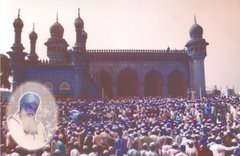

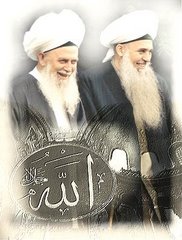

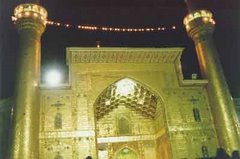

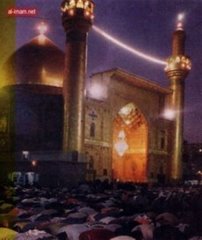

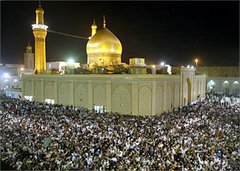




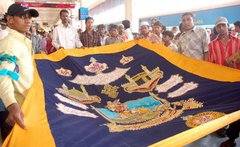
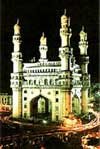



No comments:
Post a Comment